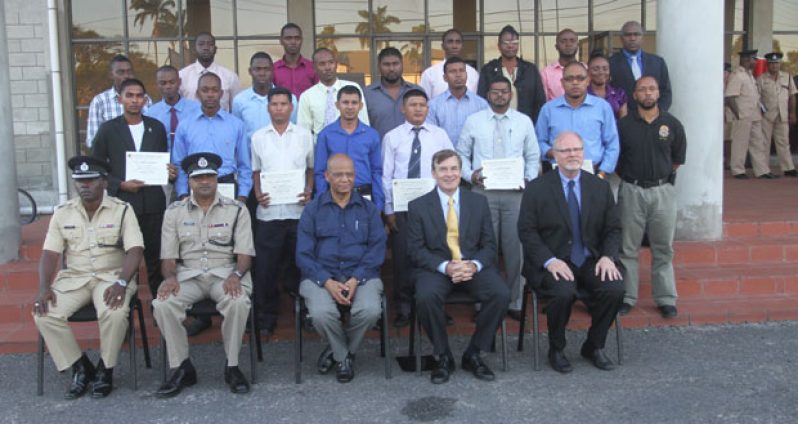A TOP priority for the Government of Guyana is building capacity in law enforcement agencies while ensuring that domestic and international security is not only enhanced, but maintained to the maximum level.

Home Affairs Minister Clement Rohee used this explanation to justify Government’s tremendous investments in the various security sectors locally.
Last Friday, while addressing the graduation and certification of several ranks from the Customs Anti-Narcotics Unit (CANU) and from various arms of the Guyana Police Force, Rohee said the training is necessary, since organized crimes and criminals are also engaged in specialized training.
The minister said he envisions various groups of criminal elements combining resources to enable better execution of their illegal activities or to outsmart or outdo law enforcement officials, and it is because of those steps being taken by the criminals that it becomes important for law enforcement personnel in Guyana and around the world to be ‘up to speed’ and be as competent as their counterparts in other parts of the world to be able to train, identify, interdict, and arrest persons who are inclined to engage in illegal activities, particularly at ports of entry.

Rohee said only recently that another training session was held to make law enforcement officers more effective in detecting and identifying persons intent on conducting illegal activities at the airports; and this is testimony to the necessity for ongoing training for law enforcement officers, who must develop a high degree of specialisation to augment their normal duties in the conduct of their lawful responsibilities. According to Rohee, it should not be a question of merely applying what has been taught in terms of building capacity with the organisations represented at the training; but rather, a broader question of national security applies.
He reminded that wherever there is large traffic at airports and at other points of entry therefore those areas need to be under constant and careful watch by law enforcers; and for them to effectively do so, constant training is necessary to put them on par with their counterparts around the world.
A total of 21 ranks drawn from the Guyana Police Force and the Customs Anti-Narcotics Unit graduated from a Drugs Enforcement Administration and Airport Interdiction training programme conducted throughout the world annually by the United States Government. That course is designed to enhance participants’ ability to detect and stop drug traffickers who utilise trans-shipment points like the airports to move drugs and money.
During the training, the team was exposed to theoretical and practical sessions, as its members went through their paces under the command of an instructor, Mr George Woessner from the United States.
In his remarks, United States Ambassador D. Brent Hardt said the training represented another step in the relationship between Guyana and the United States. According to Hardt, by sharing best practices on the structure and procedures of airport interdiction units, performing computer data analyses, and interviewing and conducting seizure operations, law enforcement capacity is boosted, security relationships are enhanced, and it is ensured that criminals do not use airports for illegitimate purposes.
Hardt reminded that illegal activities and illicit trafficking destabilise economic progress and threaten public safety, making it more likely for vulnerable populations to be lured into organised criminal networks.
He said transnational trafficking has emerged, and remains a major threat to governance and security throughout the Caribbean, as the flow of drugs, arms and people generate large profits from criminal networks, which in turn distort and undermine the rule of law, making it very hard for countries to achieve their national and economic goals.
The training in this country was very productive, the participants proved to be very knowledgeable and hardworking; and the work with personnel from the two organisations was very impressive, according to the trainer, Mr George Woessner.
Having worked with several forces and groups around the world, Woessner said, working with the Guyana team was very exceptional, and the team should be commended on the job they have done.
One of the graduated officers recalled that the more than 30 hours of interaction, which began on April 1, had seen them being put through the techniques of detecting suspicious characters and luggage passing through the ports.
The graduation event was held at the Police Training Centre on Camp Street.
By Leroy Smith





.jpg)








